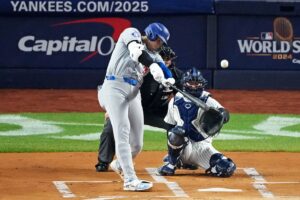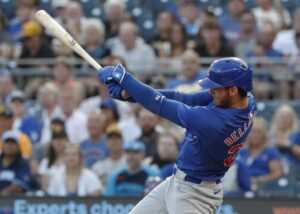The ballot for the Baseball Hall of Fame 2021 class was released Monday. It features 25 players, including 11 who are on the ballot for the first time. Ryan Thibodaux, @NotMrTibbs on Twitter, tweeted out the ballot. Thibodaux will continue his work tracking ballots as they become public from BBWAA voters.
The men who receive 75% of the vote will be announced on January, 26th, 2021, and inducted on July 25th, 2021. Additionally, they will be joined by the class of 2020 featuring Derek Jeter, Larry Walker, Ted Simmons, and a posthumous honor for Marvin Miller after their ceremony was postponed due to the Covid-19 pandemic.
The 2021 Baseball Hall of Fame ballot, as announced by @baseballhall. pic.twitter.com/gBquMDv2hK
— Ryan Thibodaux (@NotMrTibbs) November 16, 2020
Notable Returning Candidates
Curt Schilling
Curt Schilling received the highest percentage of the vote among players who were not elected in 2020 at 70%. Although his antics on social media draw questions about his character, his career speaks for itself in making it to Cooperstown. While he never won a Cy Young award, he finished second thrice, and he won 216 games with a 127 ERA+.
He pitched with great control, reaching the 3,000 strikeout milestone, and he came through whenever his team needed him in October. His postseason record of 11-2 comes with a 2.23 ERA in 133 1/3 innings pitched on three World Series champions.
Bonds and Clemens
Once again, the most controversial candidates are Barry Bonds and Roger Clemens. Like Schilling, they are in their ninth season on the ballot. Allegations of steroid user continue to be the reason that holds them out of the Hall of Fame. Bonds, the recipient of seven MVP awards received 60.7% of the vote in 2020. Meanwhile, Clemens, the recipient of seven Cy Young awards, received 61% of the vote.
A few years ago, their election appeared inevitable as they continued to receive significant jumps in the voting. In 2015, their share of the vote was in the high-30s. By 2018, they moved up into the high-50s. However, they have remained stagnant since then, and their percentages have only increased by roughly five to six percent since then.
Omar Vizquel
Additionally, Omar Vizquel is a notable returning candidate for the 2021 Hall of Fame class. Vizquel’s candidacy stems largely from his longevity, playing 24 seasons, and his defense, winning 11 Gold Glove awards. What holds his candidacy back is his lack of offense. He is a career .272 hitter with a 82 OPS+.
Despite the offense weaknesses, Vizquel has seen his percentage of the vote rise from 37% to 42.8% to 52.6% in each of his three seasons on the ballot.
Notable First Time Candidates
Torii Hunter
For 19 seasons, Torii Hunter put together a good career with three franchises. He hit 353 home runs and won nine Gold Glove awards while playing on five All-Star teams. It is worth noting that his career is similar another centerfielder that is struggling to gain traction on the ballot in Andruw Jones. Hunter had a higher batting average than Jones, .277 vs. .254, but their OPS+’s are near identical, 110 vs. 111. Although Hunter only won one less Gold Glove then Jones, Jones’s defensive metrics play out much better than Hunter with a DRS of 65 compared to 23. Jones also hit 81 more home runs in 1,028 fewer plate appearances.
Jones has yet to gain 20% of the vote in any year he has been on the ballot. That may be a sign of where Hunter’s resume leads him.
Hudson and Zito
Former Oakland A’s teammates appear on the ballot for the first time in Tim Hudson and Barry Zito. Hudson has a stronger case than Zito does. Hudson’s record of 222-133 gives him a .625 winning percentage, and he pitched to a 3.49 ERA in 3,126 2/3 innings pitched. He had an ERA+ of 120 for his career with six seasons where he topped 130. Hudson also won a World Series ring in 2014 with the San Francisco Giants.
Zito had a strong start to his career. He won the 2002 AL Cy Young award, made three All-Star games and four times led the league in games started while he was an Athletic. His ERA+ in those seven seasons was 125, but he was never the same pitcher after signing with the Giants where his ERA+ topped 100 once in the eight seasons he pitched after that. He did contribute to a World Series championship with the Giants, pitching to a 1.59 ERA in the 2012 World Series.
Mark Buehrle
A constant argument for the Baseball Hall of Fame is that of short-peak dominance versus longevity and consistency. Those who argue in favor of the latter may favor a candidate such as Mark Buehrle. He was not an overpowering pitcher, and he never struck out 200 batters, won 20 games, or pitched to an ERA below 3.12. Regardless, he was consistently a very good pitcher for his entire career.
He pitched over 200 innings in 14 consecutive seasons with his final season in 2015 snapping that streak when he threw 198 1/3 innings. He won at least ten games in 15 consecutive seasons with an ERA+ that only dipped under 100 twice. In both of those years, it never dipped lower than 95, still roughly league average. At his best, that number reached 144. His overall body of work features 214 wins, a 3.81 ERA, 117 ERA+, four Gold Glove awards, five All-Star teams, a perfect game, and a World Series championship.
Outlook
With the lack of no-doubt candidates, the 2021 Hall of Fame class may be smaller than those of the previous seven years. After getting 70% of the vote in 2020, Schilling is the closest of any candidate and should cross the 75% threshold, but there are no guarantees. Ultimately, the most interest stems from seeing what kind of boost a non-crowded ballot gives Bonds, Clemens, and Vizquel along with other returnees such as the aforementioned Jones, Todd Helton, Scott Rolen, Billy Wagner, and Andy Pettitte.
Main Photo: Embed from Getty Images






